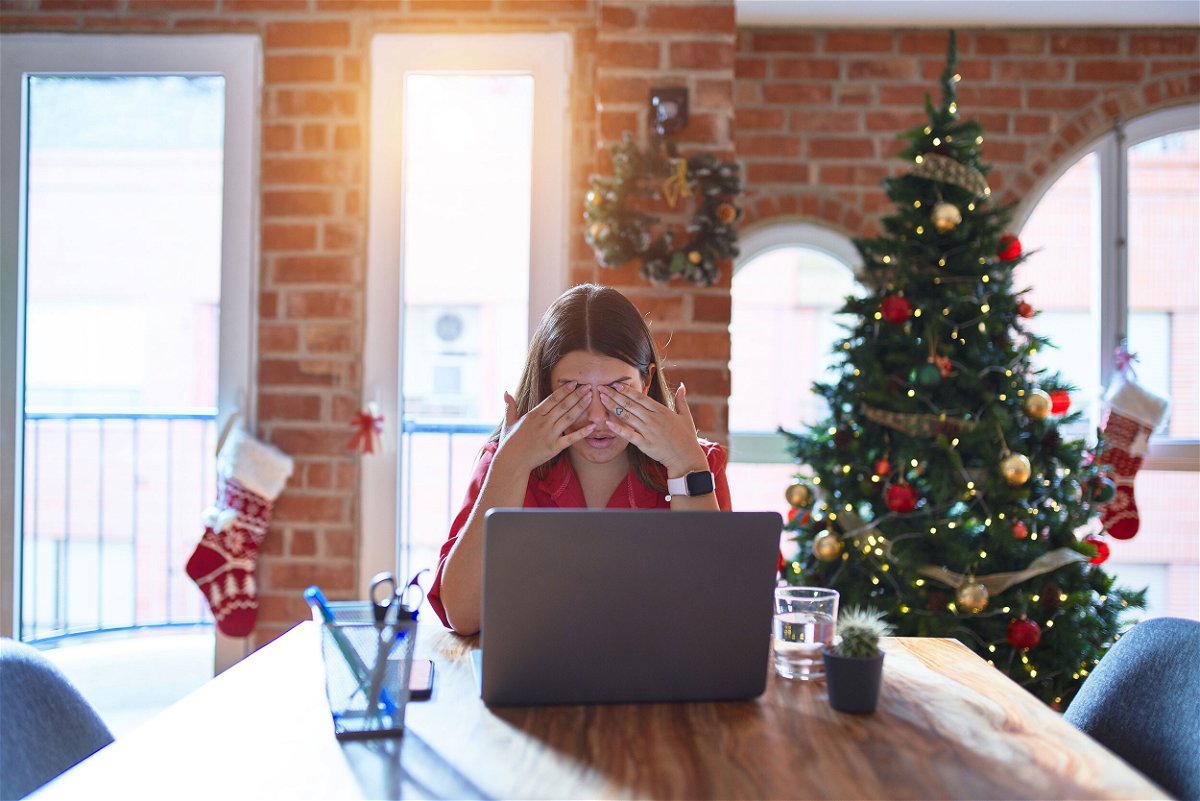Don’t ruin your slumber during the holidays. Try these sleep expert tips

Holiday responsibilities can rob us of sleep
By Sandee LaMotte, CNN
Holidays and stress seem to go hand in hand. To cope, many people often steal hours from their sleep to pack in all the cooking, shopping, gift wrapping, parties and family time.
“Even a night or two of short sleep can have short term effects on your health, mood and wellbeing,” said sleep specialist Kristen Knutson, an associate professor of neurology and preventive medicine at the Northwestern University Feinberg School of Medicine in Chicago, in an email.
“You will enjoy the holidays more if you can protect your sleep time — and you may actually get more done if you aren’t tired and inefficient from sleep deprivation, she said.
Be careful with excess food
Eating large, heavy meals causes the body to work harder to digest the foods, which can contribute to fatigue, said Steven Malin, an associate professor in the department of kinesiology and health at Rutgers University in New Jersey.
“The carbohydrate and protein as well as fat induce a series of hormonal changes that can promote changes in serotonin, which is a feel good, pleasure hormone that promotes sleepiness,” he said via email.
Eating smaller portions and taking breaks to check in with your body on how full you are can help, said sleep specialist Dr. Raj Dasgupta, an associate professor of clinical medicine at the Keck School of Medicine at the University of Southern California.
“I know this seems cruel especially when a delicious meal is right in front of you, but this tip can help reduce your feelings of sleepiness,” he said.
Try replacing the sugary and fatty foods on your holiday plate with more unprocessed, fiber-rich foods. These substitutions “slow digestion such that people feel full longer,” Malin said.
“Another approach is considering water intake. Consuming adequate water prior to eating can help extend the stomach and create a sensation of fullness,” he added.
Exercise also helps counteract feelings of sluggishness, Malin said. Even standing and moving around the house or neighborhood can help reset that “tired” switch.
And don’t keep eating and eating until the wee hours. Digestion slows when we sleep, which can lead to indigestion, heartburn or acid reflux that may wake us up, Knutson said.
“Ideally, we should stop eating 2 or more hours before we want to go to sleep. If you are hungry before bed a light snack is okay but heavy, rich food should be avoided,” she said via email.
The special role of sugar
All those holiday sweets, especially if consumed on an empty stomach while waiting for the meal, can cause swings in blood glucose, or blood sugar. Keeping your blood steady throughout the day is best for the body.
When blood sugar rises, it triggers the release of insulin, which clears glucose from the blood, Malin said.
“Drops in blood glucose due to insulin-promoting clearance in bodily cells, can promote the ‘crash’ feelings. At the same time, consuming sugar based foods later in the evening can promote bursts of energy that shift sleep back, making it harder to fall asleep,” he said via email.
Watch your alcohol intake
While many of us believe that alcohol helps us fall asleep, it actually impairs sleep quality, Dasgupta said.
“Remember, alcohol can make you fall asleep faster and sleep heavier during the first portion of the night. However, alcohol can disrupt your sleep during the second half of the night,” he said.
Alcohol acts as a suppressant on the brain, so when we drink a bit too much (or too late in the evening) we will experience drowsiness. However, halfway through the night, the liver will have finished metabolizing the alcohol into a stimulant called acetaldehyde, according to Dr. Bhanu Kolla, an addiction psychiatrist and sleep medicine expert at the Mayo Clinic.
“Therefore if you drink too much alcohol right before going to bed, in about four hours it is converted to aldehyde which can disrupt sleep and wake you up,” Kolla told CNN in a prior interview.
If you’re in a deep, restorative sleep phase about the time you wake, that interrupts the brain’s ability to repair and restore cells.
Similar to eating, try to stop drinking at least two hours before you want to go to bed to minimize its impact on your sleep, Knutson said.
Be strategic with naps
Many people look forward to that holiday nap, and often point to the turkey as the cause. First, a bit of myth-busting: Turkey is not the culprit.
“Tryptophan from turkey is unlikely to enter the brain and make enough serotonin to make us sleepy,” Malin said.
In fact, you’d have to eat about 8 pounds for turkey to have an effect, Malin said. Instead, it’s the rich, processed foods, such as candied sweet potatoes or pecan pie, that are making you feel tired.
If you do decide to have a nap, be sure to not do it too soon after eating, Dasgupta suggested.
“In general, it’s never a good idea to lay down right after a big meal especially if you have heartburn. Also, if you are someone who dealing with insomnia, I would not recommend taking a nap,” he said.
“But if you are sleep deprived from the long travel, didn’t get a lot of sleep the night before, and it’s not too late in the day, a 15 to 20 minute nap is OK,” he added via email. “Just don’t blame the nap on the turkey!”
Watch for depression
If you suffer from anxiety, depression or seasonal affective disorder (a condition that causes sadness when there’s less daylight), watching your sleep is key, experts said.
“Depression and sleep are linked. Poor sleep can impair our mood, and depression can lead to unhealthy sleep,” Knutson said.
Calming strategies can include a relaxing transition before going to sleep in which you could take a bath, meditate or listen to soothing music, she said.
To help quiet your mind, leave a notepad by your bedside so you can jot down any to-do items that may pop into your head as you try to fall asleep, Knutson suggested.
Another effective strategy is regular exercise. It plays an important role in sleep and depression, experts said, as it alleviates stress and promotes the release of the “feel-good” hormones called endorphins.
“Exercising improves sleep by reducing sleep onset, meaning it takes less time to fall asleep and decreases the amount of time you are lying in bed awake during the night,” Dasgupta said.
“Studies have shown that exercise enables individuals with insomnia to fall asleep faster, sleep longer, and enjoy better sleep quality,” he said. “Exercise is also great way to relieve stress and depression that have been common issues for people during the holidays.”
The-CNN-Wire
™ & © 2022 Cable News Network, Inc., a Warner Bros. Discovery Company. All rights reserved.



